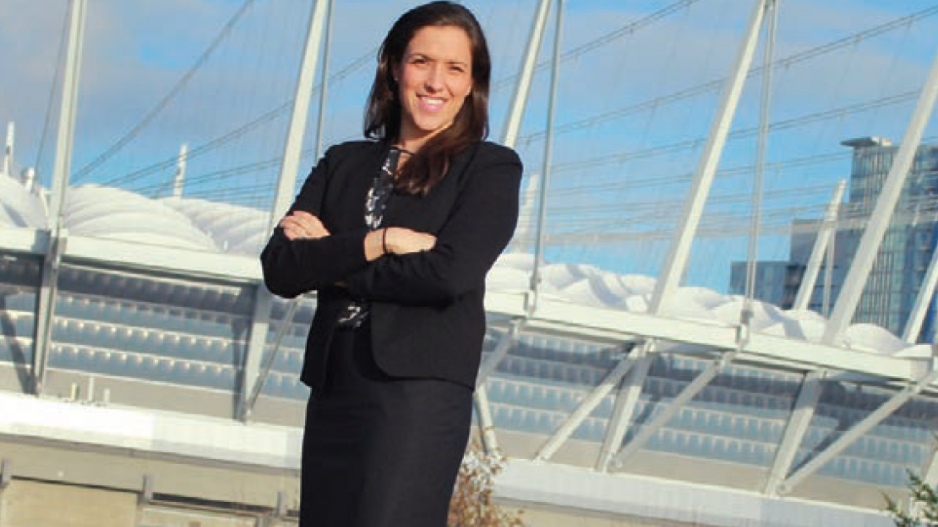The winner of the 2015 FIFA Women’s World Cup, if you were to ask an accountant, was Canada.
The U.S. team may have left with the gold medals, but the international soccer tournament left about $89 million in economic activity in Vancouver, one of six host cities across the country for the tournament last summer.
“What we know from both the Women’s World Cup and the Canada-Mexico match last year, there’s a great opportunity for international soccer in Vancouver. We got great turnout for that,” said Ty Speer, president and CEO of Tourism Vancouver.
And there are many other opportunities for the 2010 Olympic city in hosting sporting events of all shapes and sizes, suggested Speer, who took the helm of the tourism agency two years ago after serving as deputy CEO for the Glasgow 2014 Commonwealth Games and on the London 2012 Olympics organizing committee.
“Hosting the Olympics is an enormously powerful foundation on which to build something,” said Speer.
To that end, Tourism Vancouver has partnered with the City of Vancouver, the Vancouver Hotel Destination Association, Crown-owned BC Pavilion Corp. (PavCo), and the University of British Columbia (UBC) to form Sport Hosting Vancouver (SHV) with a mandate to seek out and help secure such events.
“Post-2010, we had the attraction or people wanting to knock on our door … but we didn’t really have a consolidated approach to sports hosting or the type of events that we wanted,” said Michelle Collens, SHV manager. “We hosted the Olympics, we had the Women’s World Cup already signed up, but what next?”
Within a week, the agency announced the Vancouver Convention Centre will host a National Collegiate Athletic Association (NCAA) Division 1 men’s and women’s basketball tournament in November 2017 – the first annual NCAA action for the city.
“We already had a number of things where major event organizers were approaching us to host. Our success was quite rapid,” said Collens, who previously worked for PavCo.
Putting the calendars of all contributors together, Collens and her team look for the gaps in the tourism year and sporting events that will fit. They’re not looking for a stream of large, international events.
“It’s more [of] those niche events – something with BC Hockey, for example, where we’re trying to create a house tournament that we could host every year that would be in an off-season, say, come March, utilizing UBC’s arenas. Just a rotation of events that can come on a regular basis,” said Collens.
Sport tourism is already worth more than $300 million annually to the provincial economy, and it’s one of the fastest-growing segments of the tourism industry, according to the Ministry of Community, Sport and Cultural Development.
On the wish list is a bid for the 2019 International Ice Hockey Federation World Juniors hockey tournament in December. A successful 2016 Adult Figure Skating Championships in August brought more than 300 competitors to Vancouver, and SHV is working with Skate Canada on a bid for the 2018 national championships and other figure-skating events.
A dozen sporting events a year in Vancouver is a solid medium-term goal for the city, said Speer.
“This isn’t just about bidding on international, high-profile, elite athlete events. When we look at what an event like the Rock ’n’ Roll Half Marathon can do for the city, they do a great job of promoting their event as a reason to travel. We get a lot of people who are going around the world doing half-marathons,” said Speer.
Vancouver is an attractive venue, no matter the sport, and SHV’s goal in the near term is to maximize the facilities that exist.
Those include the 5,000-seat Thunderbird Arena at UBC, the university’s soccer and rugby pitches, 55,000-seat BC Place stadium, 20,000-seat Rogers Arena, the Vancouver Convention Centre – which will be transformed into a multi-court basketball venue for the NCAA – and others.
“We’re limited on land. We can’t build things like that, and that’s where the competition is really going to start to heat up for us … is the venues to host,” said Collens.
She would like to see a 10,000-seat facility, possibly at a revitalized PNE grounds.
In the meantime, “we’ll have to get very strategic about the events that we go after,” she said. “Now it’s a matter of sitting back and understanding: what are our priorities? What are the events we want to invest in?”•




